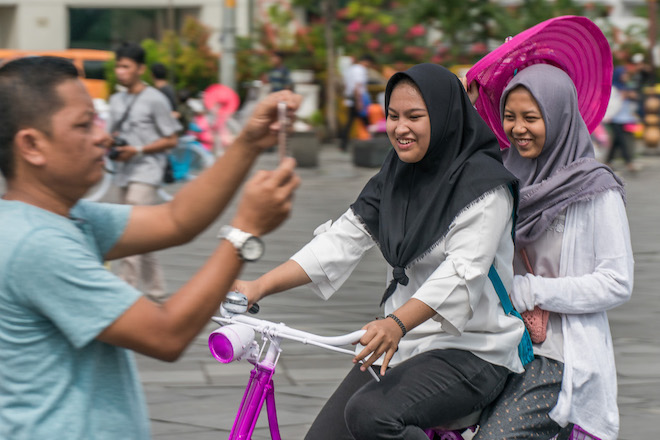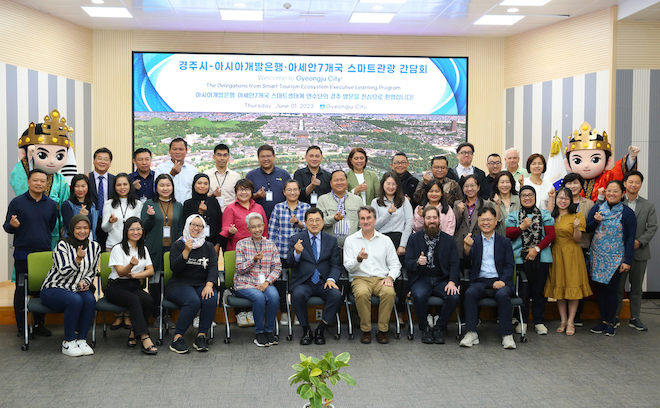
The Asian Development Bank (ADB), in collaboration with Dong-A University, and with funding support from the Republic of Korea e-Asia and Knowledge Partnership Fund, held a learning program in Busan on 29 May–2 June for 27 mid-level officials representing national tourism organizations and tourism boards in Southeast Asia.
The “Smart Tourism Ecosystem Executive Learning Program” included highly engaging presentations, problem-solving exercises, participant-led sessions, and fieldwork. Interactions with the Busan Tourism Organization, local technology firms, and officials in Gyeongju showcased good practice examples of how to use digital technologies to better manage and market tourism.
Learnings from Gyeongju
Gyeongju Mayor Nak Young Joo told participants the city is continuously working on building smart tourism infrastructure, such as expanding public Wi-Fi coverage and developing public tourism apps, to better serve tourists.
Gyeongju is one of the cities pioneering the smart tourism city concept in the Republic of Korea by leveraging technology to promote tourism.
“Smart technology does not only help tourism, but also enhances the city’s transportation, security, and environment, enabling the city to transform into a smart city where residents and visitors can enjoy convenience and safety,” said Joo.
He said Gyeongju is a leader in smart tourism having topped the 2022 Smart Tourism City Maturity Index, which assessed tourism cities based on availability of tourism assets and strong digital technology infrastructure.
Southeast Asia has been working to revive travel after arrivals plunged in the wake of the COVID-19 pandemic. Countries in the region, along with other destinations worldwide now seek to deploy smart tourism to recover from the crisis and create long-term resilience by enhancing their attractiveness, accessibility, safety, and sustainability.
The learning program aligns with the ASEAN Tourism Strategic Plan 2016–2025 and the ASEAN Declaration on Digital Tourism (2020) priorities to boost digital skills among tourism destination managers and use digital technologies to foster more competitive, inclusive, and sustainable tourism.

Bridging gaps
However, apart from a few gateway cities and primary tourist destinations, most of Southeast Asia lags its global peers in smart tourism readiness due to gaps in technology infrastructure and services, digitalization, and access to smart tourism investment.
This paved the way for the learning program, which was organized under ADB’s Technical Assistance (TA) 9572, also known as the Brunei Darussalam–Indonesia–Malaysia–Philippines East ASEAN Growth Area (BIMP-EAGA), Indonesia–Malaysia–Thailand Growth Triangle (IMT-GT), and Greater Mekong Subregion (GMS)–B-I-G Capacity Building Program, and TA 6899, or the Southeast Asia Sustainable Tourism Facility.
Learning modules covered (i) the role of digital technology to accelerate tourism recovery after the COVID-19 pandemic, (ii) good practice smart tourism ecosystem development models in the Republic of Korea, (iii) how to use a smart tourism ecosystem development canvas, (iv) smart tourism value proposition identification, (v) stakeholder and problem analysis, and (vi) resource mobilization (finance, knowledge, partnerships).
The program culminated in an integration exercise, where participants prepared and presented smart tourism action plans for secondary destinations in Cambodia, Indonesia, Lao People’s Democratic Republic, Malaysia, Philippines, Thailand, and Viet Nam.
The ADB-managed Republic of Korea e-Asia and Knowledge Partnership Fund was established in 2006 by the Republic of Korea to contribute to poverty reduction in Asia and the Pacific by improving access to information and communications technology and facilitating knowledge sharing and partnerships.
This article was first published by BIMP-EAGA on 13 June 2023.

